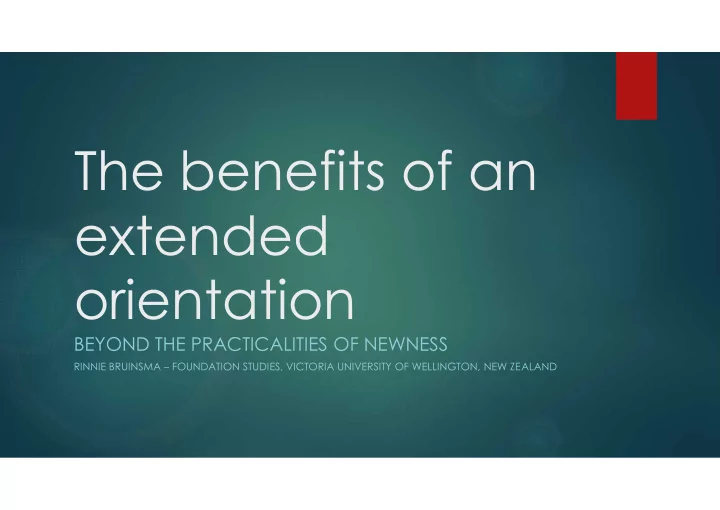

The benefits of an extended orientation BEYOND THE PRACTICALITIES OF NEWNESS RINNIE BRUINSMA – FOUNDATION STUDIES, VICTORIA UNIVERSITY OF WELLINGTON, NEW ZEALAND
Rationale • Increase social inclusion and student engagement • Help with transitioning into NZ/VUW culture • Increase students’ sense of social self-efficacy • Increase the uptake of services • Increase academic success
Delivery • Spaced out structured delivery at start of trimester • Broad and continuing platform with involvement of 4 other structured interventions • Abundant opportunity for immediate and subsequent application • Attendance on opt-out basis • Stamp card system
Student involvement FNDN activities • programme International Buddy • Programme (IBP) Victoria Plus Programme • (VicPLus) Victoria International • Leadership Programme (VILP )
Staff involvement Student Learning (SL) • Victoria International • (VI) Language Learning • Centre (LLC) Foundation Studies • Programme
Extended Orientation First Friday Second Friday Third Friday Interactive tour of the ‘Making Social ‘Seeking Help and Language Learning Contact’ - ‘Excel on Information’ – ‘Excel Centre (LLC) Campus’ on Campus’ Explanation of Rationale Rationale - - • services offered Roleplays with Roleplays with - - Use language volunteers volunteers - software Buddy afternoon Buddy afternoon - - Activity with tea tea - volunteers/buddies
“ I feel more confident and it is helpful for my study ” FNDN STUDENT FEEDBACK ON THE EXTENDED ORIENTATION PROGRAMME
“ Because it is the first time I have been to NZ. So asking for help is very important for me. ” FNDN STUDENT ON THE EXTENDED ORIENTATION P ROGRAMME
“ Positive experience because it can meet the new friends and improve my English and know ” more NZ. FNDN STUDENT ON EXTENDED ORIENTATION P ROGRAMME
“ Free dinner. Less time in one topic so there can be more topics ” FNDN STUDENTS ON THE EXTENDED ORIENTATION
Reflections Good attendance rate Increased student uptake in services International and domestic engagement More engaged students in class More students asking questions Ex-FNDN students reciprocate by becoming buddies Some evidence of increased Building of a community academic success
Reflections More time for role plays More information on cultural values of giving negative feedback (IBP matches) More time for actual use of the software (LLC) rather than tour More resources to assess/evaluate impact
References Barker M., Ishyiama I., Westwood, M., Mak A. (2008). The ExcelL Program. Enhancing • Sociocultural Competencies for Success. Retrieved from www.excellinterculturalskillsProgram.com. Gao, X., & Commons, K. (2011, June). ‘ Excel on Campus’, a programme designed to • increase international students’ participation in learning. Paper presented at the First Year in Higher Education Conference, Brisbane, Australia. Retrieved from http://www.fyhe.com.au/past_papers/papers11/FYHE-2011/content/pdf/7B.pdf Mak, A. S., & Buckingham, K. (2007). Beyond communication courses: Are there • benefits in adding skills-based EXCELL sociocultural training? International Journal of intercultural Relations (31), pp 277-291. 10.1016/j.ijintrel.2006.02.002 Mentoring programmes. Curtin University , Perth, Western Australia. • Smith, R., & Khawaja, N., G. (2011). A review of the acculturation experiences of • international students. International Journal of intercultural Relations Volume 35 (6), pp 699-713 . 10.1016/j.ijintrel.2011.08.004
Rinnie Bruinsma Foundation Studies until December 2015 – Student Learning from 2016 Victoria University of Wellington, New Zealand. rinnie.bruinsma@vuw.ac.nz
Recommend
More recommend